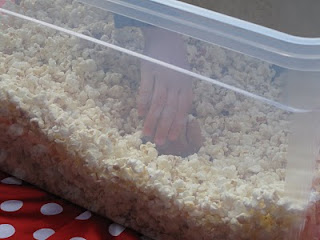... and we made The Times! With a group of friends, at Bristol's Tobacco Factory last night, watching the General Election debate, I realised (as did everyone else) that we'd been infiltrated by reporters and photographers. My clue? A card handed round saying 'Guys, I'm from The Times, if you mind me taking a photo of you, put your hands up now'. Not exactly Sherlock Holmes stuff. The Bristol Evening Post was there too.
Martin Fletcher of The Times tapped away at his laptop throughout the debate, looking up whenever a cheer or laugh burst forth, smiling when the newspaper-sponsored cakes – carrot cake Clegg, Gordon Brownies and Cameron flapjacks – were passed round (all the carrot cake had gone by the time it got to our corner. Shame), and rushing to the front of the room to do a straw poll at the end of the debate. Little did he know that some of the laughs related to leadership bingo – three cards with the words most likely to pop out of the contenders' mouths. My team got all of our phrases – no problem with 'hardworking families', 'deficit', 'billions' – apart from 'a future fair for all', surprisingly hard to come by.
Enjoy Martin Fletcher's words here:
Never mind the opinion polls. The customers in the café-bar at Bristol’s Tobacco Factory had no doubt who the tastiest candidate was in last night’s debate: Nick Clegg.
Asked to make their choice based on the leaders’ performances, ten of them selected a piece of the café-bar’s carrot cake bearing Mr Clegg’s picture. Four opted for a “Gordon Brownie”, and only one chose a ginger and orange flapjack adorned with David Cameron’s likeness.
This thoroughly unscientific survey, generously sponsored by The Times, marked a significant swing to the Liberal Democrats. Before the debate the café-bar had sold seven Gordon Brownies, four Tory flapjacks and only two Lib-Dem carrot cakes.
“It’s obviously Nick Clegg,” said Anna Barclay, 30, a photographer, when asked who she thought had won. “He comes across so well on telly. He’s a natural.”
“Clegg was the most reasonable and credible,” agreed Charles Mitton, 34, a Mencap trainer. “Brown didn’t do too badly, but Cameron seemed to be trying to get out a lot of party slogans. I just thought he was bland.”
Just across the Avon from the studio, the Tobacco Factory seemed as good a place as any from which to watch the politicians spar. Imperial Tobacco used to manufacture cigarettes in the huge old red-brick building. It now contains a theatre, restaurant, studios and small businesses. No chains are allowed — even the bar spurns big-name beers in favour of a local micro-brewery. Its watchword is independence, albeit of an arty, alternative, leftish sort. As Shakespeare’s The Tempest played in the theatre upstairs, customers packed into the room below to watch — intently — the political drama unfold.
Unlike the studio audience, they could make their views clear — laughing when Mr Clegg accused the Tories of joining a bunch of “nutters” in the European Peoples Party, cheering when a questioner asked about sustainable transport, snorting when Mr Brown cited his use of trains to campaign to underscore his green credentials.
“Yeah,” someone shouted when Mr Brown urged less dependence on oil. They nodded their heads in approval as Mr Clegg suggested that British support for America should be more critical. They “oooh-ed” sarcastically as Mr Cameron denounced Labour “lies”.
This was the first time that the café-bar had advertised a political debate on its pavement blackboard, rather than Six Nations rugby or Wimbledon. It proved just as gripping. Not a person left before the end.
Mr Clegg did not have it all his own way, however. Paul Anning, 38, a project manager with a bank, backed the Prime Minister. “I think Gordon Brown is more believable and has depth to his answers because he’s been at the front end of it,” he said. “I think Cameron has no substance. He’s just trying to grab headlines. There’s no meat on his bone.”
Wendy Brandl, 65, a retired therapist previously leaning towards the Liberal Democrats, thought that there was no clear-cut winner, just an obvious loser: Mr Cameron.
The debate over, The Times did a rather more scientific straw poll. Mr Clegg got 21 votes, Mr Brown five, Mr Cameron three. For the Lib-Dem leader it was a piece of cake.
Friday 23 April 2010
Wednesday 21 April 2010
General Election debate in Bristol!
Clegg, Cameron and Brown are heading to Bristol. The Arnolfini, to be precise, home of contemporary art. Last time I was there, I saw a man icing a chair, another going up and down the stairs – two steps forward, one step back, a shoe connected to a fan representing the artist's travels in India, and a box of popcorn, on top of a table, hiding a hand... Pictures are below, for proof. Will the political trio make anymore sense? Let's hope so! Oh, and the General Election debate is definitely happening there tomorrow, although when I wandered over there at lunchtime today, a charming Sky security guy wouldn't tell me whereabouts in the gallery exactly. No TV screens to broadcast it either; but, he assured me, there'll be a stunning illumination of the Arnolfini tonight.





Friday 2 April 2010
Subscribe to:
Posts (Atom)